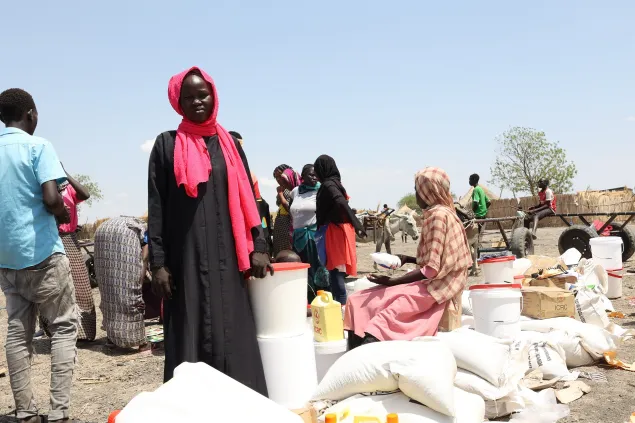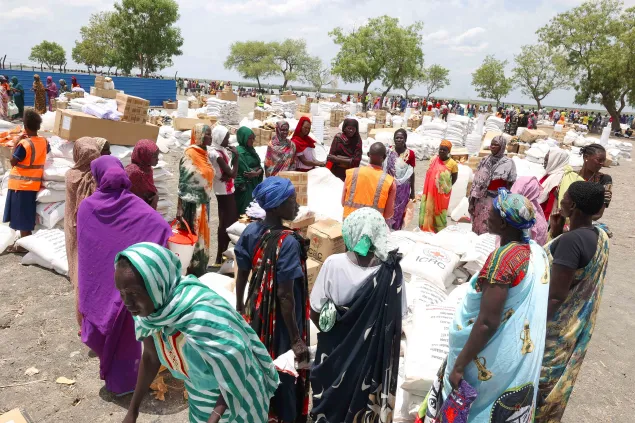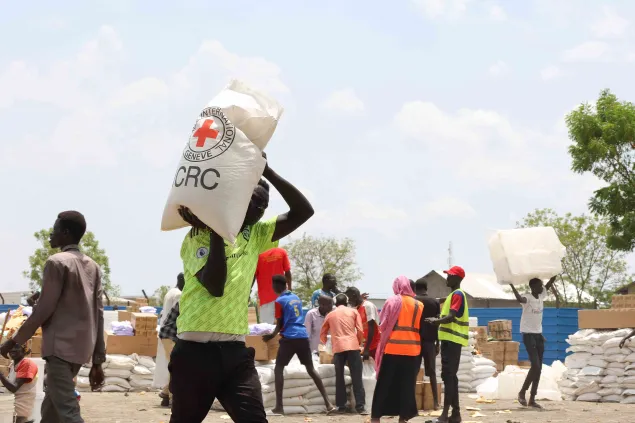South Sudan: ICRC's life-saving aid brings hope for thousands of refugees and returnees displaced by conflict

The conflict in Sudan has had a devastating impact on the civilian population, resulting in the loss of thousands of lives and the displacement of over 8 million people. Since April 2023, more than 750,000 refugees from the area have fled to neighbouring South Sudan. This includes civilians who had already been displaced once when the outbreak of conflict in South-Sudan had forced them to flee to Sudan in the last decade.

Sarah James fled to Sudan in early 2014 following the outbreak of armed conflict in South Sudan. She has been forced by the ongoing violence in Sudan to return to an uncertain future in her war-ravaged homeland.
Sarah James, a 23-year-old mother of two, has been surviving under the shadow of conflict-inflicted suffering and displacements, for the last 10 years. In early 2014, conflict in South Sudan had forced her to flee her home country and seek refuge across the border in Sudan. Given the traumatic experiences in the past, this time when the conflict broke out in 2023, Sarah and her neighbours didn’t wait for the violence to reach them in Sirajiya in Sudan’s South Kordofan state.
“We feared that the conflict could come to our doorsteps any moment, especially after nearby villages started getting bombed,” she explained. “So, we just decided to run.” After a long and perilous journey, an exhausted Sarah managed to reach Kaka, a remote village in South Sudan’s Upper Nile state, where her mother still lived.
In Kaka, the International Committee of the Red Cross (ICRC) was the first organization to provide life-saving aid to people affected by the conflict. We helped about 1,500 households of Sudanese refugees and South Sudanese returnees by giving them food and other items, including water purification equipment.
“Things are going to be better now. I am grateful for the support because there was no help when we arrived. The only food available was in the market and only those who had money could buy food. With these seeds and tools that I received, I can start to rebuild my life bit by bit,” Sarah said after receiving her ration of relief items.

The ICRC was the first organization to respond with life-saving aid in Kaka by providing food and other items to 1,500 households of refugees and returnees.
The influx of refugees and returnees escaping the conflict in Sudan, has brought additional stress on local communities already living with limited resources. However, despite their own dire circumstances, the locals have unconditionally welcomed the refugees seeking safety.
Safa, a 31-year-old mother of four and another South Sudanese returnee who was forced to leave Sudan due to the conflict, said, “The people here have been nice to me. They have not only provided me with a place to stay but also ensured I had food to eat.”
For Safa, and several others like her, help from ICRC came at the right time. “I was eating so little food that my baby never got enough breast milk. With the arrival of this food, I will eat better and there will be more milk for the baby,” she said.
We have also helped improve access to clean water for thousands of refugees, returnees, and local residents by repairing water facilities, such as handpumps. “People here were living in a very difficult situation. They used to get their water directly from the river,” explained Lokiden David Mogga, ICRC economic security field officer in Malakal, Upper Nile state.
So far in 2024, along with the repairs of handpumps that benefited about 33,000 people, we have distributed water purification equipment, cloth-filters, buckets and purification agent to over 6,900 households of South Sudanese returnees in the Jonglei, Upper Nile and Western Bahr el Ghazal states. “This year, we have helped 40,566 people in Boro Medina, Gok Machar, Kaka and Kuajok,” said Alexandre Farine, ICRC water and habitat coordinator.

As the conflict in Sudan drags on, thousands of people continue to flee to South Sudan. So far, the ICRC has helped more than 40,000 Sudanese refugees and South Sudanese returnees in various parts of South Sudan.
Among other support, our physical rehabilitation team has intensified its outreach efforts to provide crucial help to returnees and refugees with disabilities. This includes repairing and supplying new devices and wheelchairs to help them regain mobility.
Sarah also shared with us how her family got separated halfway through their escape to South Sudan. Her husband, his two other wives, and their children stayed back in Melut, Upper Nile state, while she proceeded to Kaka. In 2024, we have facilitated around 3,300 phone calls to help returnees and refugees, such as Sarah, reconnect and stay in touch with family members they had lost contact with during their displacement.
As the conflict in Sudan continues with no end in sight and amid the rapidly diminishing resources to support those worst affected by the violence, we remain committed to helping families and communities that were uprooted from their homes and now face an uncertain future.



